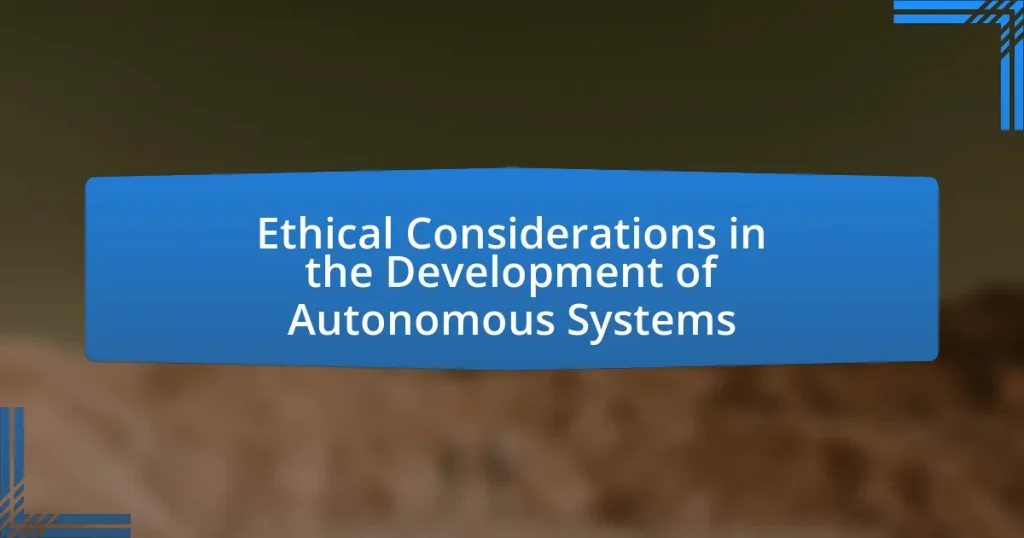The article focuses on the ethical considerations in the development of autonomous systems, emphasizing key aspects such as accountability, transparency, bias, and employment impact. It explores the importance of ethical frameworks in guiding the design and deployment of technologies like self-driving cars and drones, highlighting the ethical dilemmas faced by developers, including issues of responsibility and algorithmic bias. Additionally, the article discusses how ethical considerations influence user trust, the role of regulatory bodies, and the implications of privacy concerns, ultimately underscoring the societal impacts of these ethical frameworks on public perception and acceptance of autonomous technologies.

What are the Ethical Considerations in the Development of Autonomous Systems?
The ethical considerations in the development of autonomous systems include accountability, transparency, bias, and the impact on employment. Accountability refers to the need for clear responsibility when autonomous systems cause harm or make decisions, as seen in incidents involving self-driving cars where determining liability can be complex. Transparency involves making the decision-making processes of these systems understandable to users and stakeholders, which is crucial for trust and safety. Bias in algorithms can lead to unfair treatment of certain groups, as evidenced by studies showing that facial recognition technologies often misidentify individuals from minority backgrounds. Lastly, the impact on employment raises concerns about job displacement due to automation, with estimates suggesting that up to 800 million jobs could be affected globally by 2030. These considerations highlight the importance of ethical frameworks in guiding the development and deployment of autonomous systems.
Why is ethics important in the context of autonomous systems?
Ethics is crucial in the context of autonomous systems because it guides the decision-making processes that these systems must navigate, particularly in scenarios involving human safety and moral dilemmas. Autonomous systems, such as self-driving cars and drones, operate in complex environments where their actions can have significant consequences for human lives and societal norms. For instance, the development of ethical frameworks, like the Asilomar AI Principles, emphasizes the need for accountability, transparency, and fairness in AI systems to prevent harm and ensure public trust. These ethical considerations help developers create systems that align with human values and societal expectations, thereby mitigating risks associated with their deployment.
What ethical dilemmas arise during the design of autonomous systems?
Ethical dilemmas in the design of autonomous systems include issues of accountability, bias, and the potential for harm. Designers face the challenge of determining who is responsible when an autonomous system causes harm, as traditional liability frameworks may not apply. Additionally, algorithms can perpetuate or exacerbate existing biases, leading to unfair treatment of individuals or groups. The design process must also consider the implications of decision-making in life-and-death situations, such as in autonomous vehicles, where ethical frameworks like utilitarianism versus deontological ethics come into conflict. These dilemmas necessitate careful consideration and transparency in the design and deployment of autonomous technologies.
How do ethical considerations impact user trust in autonomous systems?
Ethical considerations significantly impact user trust in autonomous systems by influencing perceptions of safety, fairness, and accountability. When users believe that an autonomous system operates under ethical guidelines, they are more likely to trust its decisions and functionalities. For instance, a study by the Pew Research Center found that 72% of Americans expressed concern about the ethical implications of AI, indicating that transparency in decision-making processes can enhance trust. Furthermore, ethical frameworks that prioritize user privacy and data protection contribute to a positive user experience, reinforcing trust in the technology.
What frameworks exist for addressing ethical concerns in autonomous systems?
Several frameworks exist for addressing ethical concerns in autonomous systems, including the IEEE Global Initiative on Ethics of Autonomous and Intelligent Systems, the EU’s Ethics Guidelines for Trustworthy AI, and the Asilomar AI Principles. The IEEE framework emphasizes the importance of ethical considerations in the design and implementation of autonomous systems, advocating for transparency, accountability, and the prioritization of human well-being. The EU guidelines focus on ensuring that AI systems are lawful, ethical, and robust, promoting principles such as human oversight and societal benefit. The Asilomar AI Principles provide a set of guidelines aimed at ensuring the safe and beneficial development of AI technologies, emphasizing the need for research and development to be aligned with human values. These frameworks collectively aim to guide the ethical development and deployment of autonomous systems, ensuring they align with societal norms and values.
How do different ethical theories apply to autonomous system development?
Different ethical theories, such as utilitarianism, deontology, and virtue ethics, significantly influence the development of autonomous systems by providing frameworks for evaluating the moral implications of their design and deployment. Utilitarianism emphasizes maximizing overall happiness and minimizing harm, guiding developers to prioritize outcomes that benefit the greatest number of users. For instance, in autonomous vehicles, this theory may support algorithms that prioritize passenger safety while minimizing risks to pedestrians. Deontology focuses on adherence to rules and duties, which can lead to strict guidelines for autonomous systems to ensure they respect human rights and ethical standards, such as not causing harm regardless of the consequences. Virtue ethics encourages developers to cultivate moral character and virtues, promoting the creation of systems that reflect ethical values like fairness and accountability. Each of these theories offers distinct perspectives that shape the ethical landscape of autonomous system development, ensuring that technological advancements align with societal values and ethical principles.
What role do regulatory bodies play in establishing ethical guidelines?
Regulatory bodies play a crucial role in establishing ethical guidelines by creating frameworks that govern the development and deployment of autonomous systems. These organizations, such as the IEEE and ISO, develop standards that ensure safety, accountability, and transparency in technology. For instance, the IEEE’s Ethically Aligned Design initiative provides principles aimed at guiding the ethical development of autonomous and intelligent systems. By setting these standards, regulatory bodies help mitigate risks associated with technology, ensuring that ethical considerations are integrated into the design process.

How do Ethical Considerations Affect the Design of Autonomous Systems?
Ethical considerations significantly influence the design of autonomous systems by guiding developers to prioritize safety, fairness, and accountability. These considerations necessitate the integration of ethical frameworks that address potential biases in algorithms, ensuring that autonomous systems operate without discrimination. For instance, the IEEE Global Initiative on Ethics of Autonomous and Intelligent Systems emphasizes the importance of transparency and accountability in AI design, advocating for systems that can explain their decision-making processes. Furthermore, ethical guidelines often require rigorous testing and validation to mitigate risks associated with autonomous decision-making, as seen in the development of self-driving cars, where safety protocols are paramount to prevent accidents and ensure public trust.
What are the implications of bias in autonomous systems?
Bias in autonomous systems can lead to unfair treatment of individuals and groups, resulting in discriminatory outcomes. For instance, biased algorithms in facial recognition technology have been shown to misidentify people of color at higher rates than white individuals, as evidenced by a study from MIT Media Lab, which found that facial recognition systems misclassified darker-skinned women 34.7% of the time compared to 0.8% for lighter-skinned men. This bias can perpetuate existing societal inequalities and undermine trust in technology. Furthermore, biased decision-making in autonomous vehicles could lead to accidents or harm to marginalized communities, raising significant ethical concerns regarding accountability and responsibility in the deployment of such systems.
How can developers identify and mitigate bias in algorithms?
Developers can identify and mitigate bias in algorithms by implementing systematic auditing processes and employing diverse datasets. Systematic auditing involves regularly evaluating algorithms for fairness and accuracy, using metrics such as disparate impact and equal opportunity to assess performance across different demographic groups. Employing diverse datasets ensures that the training data reflects a wide range of perspectives and experiences, which helps to reduce the risk of bias. Research has shown that algorithms trained on biased data can perpetuate existing inequalities; for instance, a study by ProPublica found that a risk assessment algorithm used in the criminal justice system was biased against African American defendants. By combining these approaches, developers can create more equitable algorithms that better serve all users.
What are the consequences of biased decision-making in autonomous systems?
Biased decision-making in autonomous systems can lead to significant negative consequences, including perpetuation of discrimination, loss of trust, and safety risks. When algorithms are trained on biased data, they may produce outcomes that favor certain groups over others, resulting in unfair treatment in areas such as hiring, law enforcement, and lending. For instance, a study by ProPublica found that a predictive policing algorithm disproportionately targeted minority communities, leading to increased scrutiny and potential harm to those populations. Additionally, biased systems can erode public trust in technology; if users perceive that an autonomous system is unfair, they may reject its use altogether, undermining its intended benefits. Furthermore, biased decision-making can pose safety risks, as seen in autonomous vehicles that may misinterpret road conditions or pedestrian behavior based on flawed data, potentially leading to accidents. These consequences highlight the critical need for ethical considerations in the development and deployment of autonomous systems.
How do privacy concerns influence the development of autonomous systems?
Privacy concerns significantly influence the development of autonomous systems by necessitating the integration of robust data protection measures. As these systems often rely on vast amounts of personal data for functionality, developers must prioritize user privacy to comply with regulations such as the General Data Protection Regulation (GDPR) in Europe, which imposes strict guidelines on data collection and processing. This regulatory framework compels organizations to implement privacy-by-design principles, ensuring that data protection is embedded in the technology from the outset. Furthermore, public apprehension regarding surveillance and data misuse drives developers to adopt transparency practices, such as clear data usage policies and user consent mechanisms, to foster trust and acceptance among users.
What measures can be taken to protect user data in autonomous systems?
To protect user data in autonomous systems, implementing robust encryption protocols is essential. Encryption safeguards data during transmission and storage, ensuring that unauthorized access is prevented. For instance, the use of Advanced Encryption Standard (AES) has been widely adopted in various industries, providing a high level of security for sensitive information. Additionally, regular security audits and vulnerability assessments can identify potential weaknesses in the system, allowing for timely remediation. According to a 2021 report by the International Data Corporation, organizations that conduct regular security assessments reduce the risk of data breaches by up to 30%. Furthermore, employing strict access controls and user authentication measures ensures that only authorized personnel can access sensitive data, thereby minimizing the risk of data exposure.
How do privacy regulations impact the design of these systems?
Privacy regulations significantly influence the design of autonomous systems by mandating the incorporation of data protection measures. These regulations, such as the General Data Protection Regulation (GDPR) in Europe, require systems to implement features like data minimization, user consent mechanisms, and the right to data access and deletion. For instance, GDPR enforces strict guidelines on how personal data is collected, processed, and stored, compelling developers to design systems that prioritize user privacy from the outset. This regulatory framework not only shapes technical specifications but also drives organizations to adopt transparency and accountability practices, ensuring that user data is handled ethically and securely.

What are the Societal Impacts of Ethical Considerations in Autonomous Systems?
The societal impacts of ethical considerations in autonomous systems include enhanced public trust, improved safety standards, and the promotion of equitable access to technology. Ethical frameworks guide the design and deployment of these systems, ensuring they align with societal values and norms. For instance, the implementation of ethical guidelines can lead to the development of autonomous vehicles that prioritize pedestrian safety, thereby reducing accidents and fatalities. Research by the IEEE Global Initiative on Ethics of Autonomous and Intelligent Systems highlights that ethical considerations can foster innovation while addressing concerns about bias and discrimination in algorithmic decision-making. This alignment with ethical standards not only mitigates risks but also encourages broader acceptance and integration of autonomous technologies in everyday life.
How do ethical considerations shape public perception of autonomous systems?
Ethical considerations significantly shape public perception of autonomous systems by influencing trust and acceptance levels. When ethical concerns, such as safety, accountability, and bias, are addressed transparently, public confidence in these technologies increases. For instance, a 2021 survey by the Pew Research Center found that 72% of respondents expressed concern about the ethical implications of AI, indicating that perceived ethical shortcomings can lead to skepticism and resistance. Conversely, companies that prioritize ethical frameworks in their development processes, such as implementing fairness algorithms and ensuring data privacy, tend to foster a more favorable public image, thereby enhancing acceptance and integration of autonomous systems into society.
What factors contribute to public skepticism regarding autonomous technologies?
Public skepticism regarding autonomous technologies is primarily driven by concerns over safety, lack of transparency, and ethical implications. Safety concerns arise from high-profile accidents involving autonomous vehicles, such as the Uber self-driving car fatality in 2018, which heightened fears about the reliability of these systems. Lack of transparency in how autonomous technologies make decisions contributes to distrust, as many consumers feel uninformed about the algorithms and data driving these systems. Ethical implications, including issues of accountability and bias in decision-making processes, further exacerbate skepticism; for instance, studies have shown that algorithms can perpetuate existing societal biases, leading to unfair outcomes. These factors collectively foster a climate of uncertainty and hesitation among the public regarding the adoption of autonomous technologies.
How can transparency in development improve public trust?
Transparency in development enhances public trust by providing clear insights into decision-making processes and operational mechanisms. When stakeholders, including the public, can access information about how autonomous systems are designed, tested, and implemented, they are more likely to feel confident in the integrity and safety of these technologies. For instance, studies have shown that when organizations disclose their algorithms and data usage, public acceptance increases, as seen in the 2020 survey by the Pew Research Center, which indicated that 70% of respondents favored transparency in AI systems to ensure ethical use. This openness reduces uncertainty and fosters a sense of accountability, ultimately leading to greater trust in the systems being developed.
What are the potential consequences of neglecting ethical considerations?
Neglecting ethical considerations in the development of autonomous systems can lead to significant negative consequences, including harm to individuals, societal distrust, and legal repercussions. For instance, autonomous vehicles that fail to prioritize safety due to ethical oversights can result in accidents, causing injury or death. Additionally, the lack of ethical frameworks can foster public skepticism towards technology, hindering adoption and innovation. Legal consequences may arise from violations of regulations or standards, leading to financial penalties and reputational damage for organizations. These outcomes underscore the critical importance of integrating ethical considerations into the design and deployment of autonomous systems.
How can ethical lapses lead to societal harm?
Ethical lapses can lead to societal harm by undermining trust in institutions and technologies, which can result in widespread negative consequences. For instance, when developers of autonomous systems prioritize profit over ethical considerations, they may create biased algorithms that perpetuate discrimination, as seen in facial recognition technologies that misidentify individuals from minority groups. This not only harms those individuals but also erodes public confidence in technological advancements and regulatory bodies. Furthermore, ethical lapses can lead to safety risks, such as in the case of autonomous vehicles that fail to adhere to safety protocols, potentially causing accidents and injuries. The societal impact is profound, as these incidents can lead to calls for stricter regulations, increased scrutiny, and a general reluctance to adopt beneficial technologies.
What lessons can be learned from past failures in autonomous system ethics?
Past failures in autonomous system ethics highlight the critical importance of transparency, accountability, and stakeholder engagement. For instance, the 2018 Uber self-driving car incident, which resulted in a pedestrian fatality, underscored the need for clear ethical guidelines and robust safety protocols in autonomous technology. This event revealed that insufficient oversight and lack of ethical considerations in design and deployment can lead to catastrophic outcomes. Furthermore, the failure of the Boeing 737 MAX, attributed to flawed automated systems and inadequate regulatory scrutiny, emphasizes the necessity for rigorous ethical standards and comprehensive testing. These examples demonstrate that integrating ethical frameworks into the development process is essential to prevent harm and ensure public trust in autonomous systems.
What best practices should developers follow to ensure ethical development?
Developers should prioritize transparency, accountability, and inclusivity to ensure ethical development. Transparency involves clearly communicating how algorithms function and the data they utilize, which fosters trust among users. Accountability requires developers to take responsibility for the outcomes of their systems, ensuring mechanisms are in place to address any negative impacts. Inclusivity means considering diverse perspectives during the development process to avoid biases and ensure that the technology serves all segments of society. Research by the IEEE Global Initiative on Ethics of Autonomous and Intelligent Systems emphasizes these principles, highlighting that ethical frameworks must be integrated into the design and deployment of technology to mitigate risks and enhance societal benefits.
How can interdisciplinary collaboration enhance ethical outcomes in autonomous systems?
Interdisciplinary collaboration can enhance ethical outcomes in autonomous systems by integrating diverse perspectives and expertise, which leads to more comprehensive ethical assessments. For instance, combining insights from computer science, ethics, law, and social sciences allows for a holistic understanding of the implications of autonomous technologies. Research indicates that projects involving multidisciplinary teams are more likely to identify potential ethical dilemmas and develop solutions that consider various stakeholder interests, thereby reducing risks associated with bias and unintended consequences. A study by the IEEE Global Initiative on Ethics of Autonomous and Intelligent Systems highlights that such collaboration fosters a culture of accountability and transparency, essential for building public trust in these technologies.
What role does continuous ethical training play for developers in this field?
Continuous ethical training plays a crucial role for developers in the field of autonomous systems by ensuring they are equipped to make responsible decisions that align with societal values and legal standards. This training helps developers understand the ethical implications of their work, such as bias in algorithms, privacy concerns, and the potential impact of autonomous systems on society. Research indicates that organizations that prioritize ethical training see a reduction in ethical breaches and an increase in public trust, as developers are better prepared to navigate complex moral dilemmas. For instance, a study by the IEEE found that 87% of engineers believe ethical training improves their decision-making capabilities, highlighting its importance in fostering a culture of accountability and ethical awareness in technology development.


